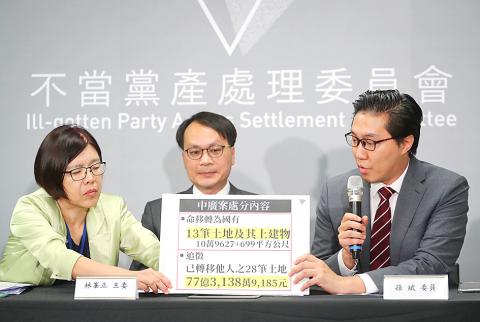The Ill-gotten Party Assets Settlement Committee yesterday declared Broadcasting Corp of China (BCC, 中廣) an affiliate of the Chinese Nationalist Party (KMT), ordering it to relinquish 109,627m2 of land to the state and pay NT$7.731 billion (US$249.283 million) in compensation.
The committee said that the finances, business and personnel of the company had been effectively under the control of the KMT until 2016, when it, through party-controlled Hua Hsia Investment Holding Co (華夏投資), sold 96.95 percent of BCC shares under its control at a steep discount to Hao Ting Co (好聽), Yueh Yueh Co (悅悅), Boyinyuan Co (播音員) and Guangbojen Co (廣播人).
The committee said that BCC’s ill-gotten assets could be split into two major categories: land and assets appropriated from now-defunct Taiwan Hoso Kyokai and those purchased with government funding.

Photo: CNA
The committee ordered BCC to transfer ownership of a broadcasting unit and a former broadcasting bureau building in Chiayi County’s Minsyong Township (民雄) and a broadcasting unit on Toad Mountain (蟾蜍山) in New Taipei City’s Jingmei District (景美) — totaling 109,627m2 of land and 699m2 of building space — to the state, per the Act Governing the Handling of Illegal Assets by Political Parties and Their Affiliate Organizations (政黨及其附隨組織不當取得財產處理條例).
It also demanded that BCC compensate the government for assets acquired via ill-gotten means that have already been transferred to a third party or requisitioned by the government.
Among such assets is Taipei’s luxury residential complex The Palace (帝寶).
The company should transfer ownership of the properties and pay the government within 30 days of receiving official notice, the committee said.
However, as the radio frequencies that BCC operates on are within the jurisdiction of the National Communications Commission, they were not considered, it added.

A preclearance service to facilitate entry for people traveling to select airports in Japan would be available from Thursday next week to Feb. 25 at Taiwan Taoyuan International Airport, Taoyuan International Airport Corp (TIAC) said on Tuesday. The service was first made available to Taiwanese travelers throughout the winter vacation of 2024 and during the Lunar New Year holiday. In addition to flights to the Japanese cities of Hakodate, Asahikawa, Akita, Sendai, Niigata, Okayama, Takamatsu, Kumamoto and Kagoshima, the service would be available to travelers to Kobe and Oita. The service can be accessed by passengers of 15 flight routes operated by

Alain Robert, known as the "French Spider-Man," praised Alex Honnold as exceptionally well-prepared after the US climber completed a free solo ascent of Taipei 101 yesterday. Robert said Honnold's ascent of the 508m-tall skyscraper in just more than one-and-a-half hours without using safety ropes or equipment was a remarkable achievement. "This is my life," he said in an interview conducted in French, adding that he liked the feeling of being "on the edge of danger." The 63-year-old Frenchman climbed Taipei 101 using ropes in December 2004, taking about four hours to reach the top. On a one-to-10 scale of difficulty, Robert said Taipei 101

MORE FALL: An investigation into one of Xi’s key cronies, part of a broader ‘anti-corruption’ drive, indicates that he might have a deep distrust in the military, an expert said China’s latest military purge underscores systemic risks in its shift from collective leadership to sole rule under Chinese President Xi Jinping (習近平), and could disrupt its chain of command and military capabilities, a national security official said yesterday. If decisionmaking within the Chinese Communist Party has become “irrational” under one-man rule, the Taiwan Strait and the regional situation must be approached with extreme caution, given unforeseen risks, they added. The anonymous official made the remarks as China’s Central Military Commission Vice Chairman Zhang Youxia (張又俠) and Joint Staff Department Chief of Staff Liu Zhenli (劉振立) were reportedly being investigated for suspected “serious

Taiwanese and US defense groups are collaborating to introduce deployable, semi-autonomous manufacturing systems for drones and components in a boost to the nation’s supply chain resilience. Taiwan’s G-Tech Optroelectronics Corp subsidiary GTOC and the US’ Aerkomm Inc on Friday announced an agreement with fellow US-based Firestorm Lab to adopt the latter’s xCell, a technology featuring 3D printers fitted in 6.1m container units. The systems enable aerial platforms and parts to be produced in high volumes from dispersed nodes capable of rapid redeployment, to minimize the risk of enemy strikes and to meet field requirements, they said. Firestorm chief technology officer Ian Muceus said